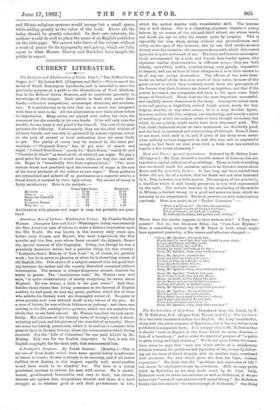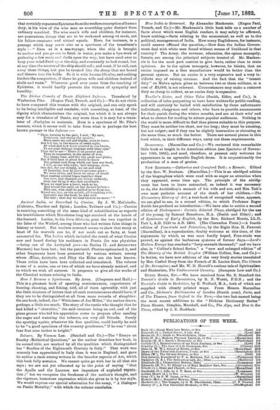The Encheiridion of Epictetus. Translated from the Greek, by T.
W. II. Rolleston, B.S. (Kegan Paul, Trench, and Co.)—Tho Encheiri- dion has been translated before into English. Mr. Long translated it, along with the other remains of Epictetus ; but it has not before been published in a separate form. It is a happy idea in Mr. Rolleston that it should " exist in English in the form which its name denotes,— that of a handbook ;" and so serve the practical purpose of " a guide to plain living and high thinking." We do not quite follow the trans- lator when he says that " man con never arrive at a satisfactory relation towards tho problems and mysteries of life, except by follow- ing out the lines of Greek thought, with its resolute logic, combined with reverence for that which gives the data for logic,—human experience." We think that the " problems and mysteries of life " can never be explained except by revelation. Still, we may profit much by Epictetus, as we may profit much by St. Paul. Only, Hebraism most be taken into account as well as Hellenism, if we are to have the " union of sane practice with sound theory." Mr. Rolleston thinks that this union is "the final triumph of Hellenism." One thing that certainly separates Epictetus from the modern conception of human duty, is his view of the wise man as something quite distinct from ordinary mankind. The wise man's wife and children, for instance, are possessions, things that are to be reckoned among va kris, not his fellow-creatures and virtual equals. Here, for instance, is a . passage which may serve also as a specimen of the translator's style :—" Even as in a sea-voyage, when the ship is brought to anchor and you go out to fetch in water, you make a bye-work of gathering a few roots and shells upon the way, but have need ever to keep your mind fixed up in the ship, and constantly to look round, lest at any time the master of the ship should call ; and must, if he call, cast away those things, lest you be treated like the sheep that are bound and thrown into the holds. So it is with human life also, and nothing hinders the comparison, if there be given wife and children instead of shells and roots." Whatever good ever came from the teaching of Epictetns, it would hardly promote the virtues of sympathy and humility.



































 Previous page
Previous page